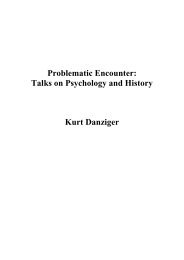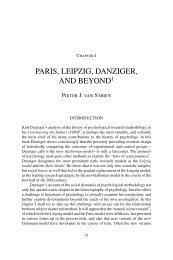The positivist repudiation of Wundt - Kurt Danziger
The positivist repudiation of Wundt - Kurt Danziger
The positivist repudiation of Wundt - Kurt Danziger
Create successful ePaper yourself
Turn your PDF publications into a flip-book with our unique Google optimized e-Paper software.
THE POSITIVIST REPUDIATION OF WUNDT 227<br />
5. This division appears as early as the Vorlesungen iiber die Menschen-und Thierseele <strong>of</strong> 1863 and<br />
receives its systematic treatment in the long section on “the logic <strong>of</strong> psychology” in the Logik (1883).<br />
As was his custom, <strong>Wundt</strong> returns to the topic on a number <strong>of</strong> occasions, notably in a paper on the division<br />
<strong>of</strong> the sciences in the fifth volume <strong>of</strong> Philosophische Studien, in his Introduction to Philosophy <strong>of</strong> 1901,<br />
and in subsequent editions <strong>of</strong> the Logik. Everything that <strong>Wundt</strong> wrote on the subject contradicts Boring’s<br />
bald claim that “to Fechner and <strong>Wundt</strong> scientific meant experimental” (Boring, Experimental Psychology,<br />
p. 321).<br />
6. Wilhelm <strong>Wundt</strong>, “uber psychische KausalitSIt und das Princip des psycho-physischen Parallelismus,”<br />
Philosophische Studien 10 (1894): 1-124, pp. 95-96.<br />
7. Recent discussions <strong>of</strong> the content <strong>of</strong> <strong>Wundt</strong>’s principles <strong>of</strong> psychic causality will be found in <strong>The</strong>odore<br />
Mischel, “<strong>Wundt</strong> and the Conceptual Foundations <strong>of</strong> Psychology,” Philosophy and Phenomenological<br />
Research 31 (1970): 1-26; and in Arthur L. Blumenthal, “Wilhelm <strong>Wundt</strong> and Early American Psychology:<br />
A Clash <strong>of</strong> Two Cultures,” Annals <strong>of</strong> the New York Academy <strong>of</strong> Sciences 291 (1977): 13-20.<br />
8. <strong>Wundt</strong>, “Ober psychische Kausalitgt,” p. 117.<br />
9. See, for example, the introduction <strong>of</strong> the third edition <strong>of</strong> the Grundziige derphysiologischen Psycholo<br />
gie (Leipzig: Engelmann, 1887).<br />
10. Wilhelm <strong>Wundt</strong>, Outlines <strong>of</strong> Psychology (Leipzig: Engelmann, 1896), p. 17. <strong>Wundt</strong> also considered<br />
psychology to be <strong>of</strong> relevance to philosophy, especially in the area <strong>of</strong> ethics.<br />
11. See Frederico Kiesow’s statement in Carl Murchison, A History <strong>of</strong> Psychology in Autobiography,<br />
vol. 1 (Worcester, Mass.: Clark University Press, 1930).<br />
12. Wilhelm <strong>Wundt</strong>, ‘‘Uber die Definition der Psychologie,” Philosophische Studien 12 (1896): 1-66.<br />
13. Oswald Kiilpe, Outlines <strong>of</strong> Psychology (New York: Macmillan, 1895), p. 4. (Original 1893.)<br />
14. Ibid., p. 3.<br />
15. Ibid., p. 6. It is worth noting that many aspects <strong>of</strong> Kiilpe’s position had been anticipated by Hugo<br />
MUnsterberg (Beitrage zur experimentellen Psychologie [Freiburg: Mohr, 1889]), against whom <strong>Wundt</strong><br />
directed his remarks in his 1894 paper on psychic causality. MUnsterberg, however, based his conception<br />
<strong>of</strong> psychology as a natural science on an extreme form <strong>of</strong> philosophical dualism which gained no adherents<br />
among psychologists. Nevertheless, his conception <strong>of</strong> psychology had a pr<strong>of</strong>ound influence on the formula-<br />
tions <strong>of</strong> many psychologists who contributed to the rise <strong>of</strong> behaviorism, like Knight Dunlap, Margaret<br />
Floy Washburn, E. B. Holt, and R. M. Yerkes (see Knight Dunlap and Margaret FIoy Washburn in<br />
Murchison, Autobiography, vol. 2). Miinsterberg’s role in the history <strong>of</strong> modern psychology, which has<br />
been the victim <strong>of</strong> several <strong>of</strong> Boring’s strongest biases, very much requires reassessment.<br />
16. Richard Heinrich Ludwig Avenarius, Kritik der reinen Erfahrung (Leipzig: Reisland, 1888- 1890);<br />
“Bemerkungen zum Begriff des Gegenstandes der Psychologie,” Vierteljahrschrt$ fur wissenschafiliche<br />
Philosophie 18 (1894): 137-161, 400-420; 19 (1895): 1-18, 129-145.<br />
17. In the fifth edition <strong>of</strong> his classic Analysis <strong>of</strong> Sensations, Ernst Mach writes: “As to the views <strong>of</strong><br />
Avenarius, the affinity between them and my own is as great as can possibly be imagined where two writers<br />
have undergone a different process <strong>of</strong> development, work in different fields, and are completely indepen-<br />
dent <strong>of</strong> one another.” (Ernst Mach, <strong>The</strong> Analysis <strong>of</strong> Sensations [New York; Dover, 19591, pp. 46-47).<br />
Avenarius had already acknowledged the existence <strong>of</strong> this special affinity. In the present context it is inter-<br />
esting to note that Mach gives special emphasis to the convergence <strong>of</strong> his views and those <strong>of</strong> Avenarius in<br />
regard to matters psychological: “But it is to our agreement in the conception <strong>of</strong> the relation between the<br />
physical and the psychical that I attach the greatest importance. For me this is the main point at issue.<br />
It was by means <strong>of</strong> his psychological articles that I first became convinced <strong>of</strong> this coincidence between<br />
Avenarius and myself’ (ibid., p. 50).<br />
18. Ibid., pp. 23-23.<br />
19. Mach writes: “All special psychical causality disappears,” and “ . . . the assumption <strong>of</strong> a special<br />
psychical agent appears to me to be a presupposition which is unfortunate and can only do harm by making<br />
investigation difficult” (ibid., pp. 54-55). And again: ” the phenomena <strong>of</strong> volition must , . . be explained<br />
by means <strong>of</strong> the physical forces <strong>of</strong> the organism alone” (ibid., p. 171).<br />
20. Many <strong>of</strong> the ideas advanced by Gilbert Ryle in his well-known <strong>The</strong> Concept <strong>of</strong> Mind (London:<br />
Hutchinson, 1949) bear more than a superficial resemblance to points made by Avenarius.<br />
21. Kiilpe was an individual <strong>of</strong> very diverse interests which he was strikingly unable to integrate during<br />
his relatively short scholarly life. Consequently, he never adopted any particular position for very long,<br />
and soon turned against Mach’s positivism. In the 1890s. however, he was clearly to be counted among the<br />
adherents <strong>of</strong> the new philosophy <strong>of</strong> science and exerted considerable influence on its behalf. It is the Kiilpe<br />
<strong>of</strong> this period that we are concerned with here, not the later Kiilpe. Nevertheless, it is noteworthy that the<br />
work <strong>of</strong> the Wiirzburg School was inspired by the search for a new Machian “element” when the hitherto<br />
recognized elements were found to be inadequate.<br />
22. <strong>Wundt</strong>, “Ober psychische Kausalitit.”





